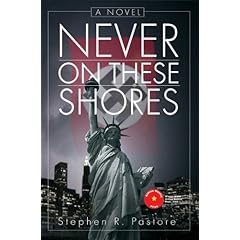Why I Wrote a Novel About the Day the KKK Welcomed Nazi Invaders
1942: The Nazis have successfully landed in Mexico and have invaded the United States through Texas. The Japanese have conquered western Canada and have captured and occupied most of the West Coast from Seattle to the outskirts of Los Angeles. The Italians have launched a massive amphibious assault from Cuba and have taken control of Florida and the Southeast as far north as Atlanta. New York City and Washington D.C. are fortifying and preparing for the onslaught. American forces are stranded in Europe and Southeast Asia. The homeland is being defended neighborhood to neighborhood by women, the elderly and gay men, all ineligible for military service. The KKK and Right Wing radicals are supporting the invaders helping to establish concentration camps where Blacks and Jews are being transported all over the western U.S. Amid the carnage and brutality of an enemy seeking to destroy everything in its path, the American Spirit is put to its greatest test.
 The ideas and themes inspiring the writing of Never on These Shores occurred in a coffee shop (of course) in Florida where I was discussing Americans’ penchant for flying flags on their gas stations, car dealerships, homes and autos (in the form of decals) and I made the observation that no citizens of other countries seem so inclined (adding that virtually every flag/decal is made in China) and that this particular form of “patriotism” creates in Americans a notion of moral superiority which in turn leads to a form of gung-ho diplomacy.
The ideas and themes inspiring the writing of Never on These Shores occurred in a coffee shop (of course) in Florida where I was discussing Americans’ penchant for flying flags on their gas stations, car dealerships, homes and autos (in the form of decals) and I made the observation that no citizens of other countries seem so inclined (adding that virtually every flag/decal is made in China) and that this particular form of “patriotism” creates in Americans a notion of moral superiority which in turn leads to a form of gung-ho diplomacy.
I remembered at some point in the discussion being taught in grade school that America was invulnerable to direct attack (prior to ICBMs and long-range bombers) making us feel particularly safe and that virtually every country in Europe owed its existence to American intervention in both World Wars. It dawned on me, whether incorrectly or not, that the victory of Allied forces in WWII was not a result of anything the Allies did but in fact to Hitler’s absurd opening of the Russian Front before knocking out Britain. Without England, the very ocean that protected American soil from invasion was the same ocean that would have prevented American intercession in either war, especially WWII. It was a few sips of strong coffee later that it became obvious that had Hitler conquered Britain, the US would have been impotent to save anyone (having no place to land troops and materials) and furthermore, Hitler had no necessity to land on American soil but could readily “invade” any number of Central American “banana republics” which would need little coercion to encourage their already strong dislike of their bullying northern neighbor.
Someone interjected that there were new discoveries concerning the Diary of Anne Frank and the conversation turned to the persecution of the Jews in Europe and how such a thing could never have occurred in the US, again emphasizing Americans’ view that they are morally superior. I pointed out that at the beginning of WWII there were at least 3 million known members of the KKK and possibly as many as 15 million, that Americans were as “put-off” by Jews (and Blacks) as anyone in Europe and I posited that not many Americans would have been hiding either Jews or Blacks in their attics or basements and that an American would be as fearful as a Dutchman, a Pole or a Romanian about risking their lives to protect someone they were already wary of to begin with. After all, America is a hodge-podge of all European peoples and they certainly did not check their prejudices at the coat room on Ellis Island.
Within a few days of the coffee clutch, I began writing Never on These Shores. What started out as a book meant to illustrate that Americans are no different than anyone else, evolved into a novel that proposes that people in general have innate virtues and flaws that will rise to the surface when confronted with real and imminent threats, that it is not patriotism that matters but moral fiber.
It is interesting to note that no reviewer (and there are many) of the book ever said that the story was improbable or unrealistic. I was a big fan (for lack of a better word) of Aristotle’s’ Poetics in college, where he said that a work of fiction will rise or fall depending on its plausibility. Apparently, everyone that reads Shores finds it plausible. That is gratifying because despite my own pessimism in light of current world affairs, the book, I hope, points out that human beings do have a moral compass, that the priorities of Americans (and every other nationality) need to shift from feeling good about America to feeling good about being human. I hope I do not sound preachy or optimistic or, worse, sappy. I enjoy the Jerry Springer Show, Matthew Arnold’s poetry, America’s Next Top Model, the novels of Thomas Hardy and a good cup of coffee in a bookshop. I don’t know how I’d react if the Nazis marched by my house. I’d like to think that I’d be heroic, protective, defiant and quick-witted. I hope Never on These Shores makes everyone feel that way.